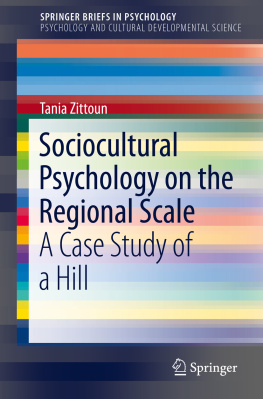Theory and History in the Human and Social Sciences
Series Editor
Jaan Valsiner
Department of Communication and Psychology, Aalborg University, Aalborg, Denmark
Theory and History in the Human and Social Scienceswill fill in the gap in the existing coverage of links between new theoretical advancements in the social and human sciences and their historical roots. Making that linkage is crucial for the interdisciplinary synthesis across the disciplines of psychology, anthropology, sociology, history, semiotics, and the political sciences. In contemporary human sciences of the 21st there exists increasing differentiation between neurosciences and all other sciences that are aimed at making sense of the complex social, psychological, and political processes. Thus new series has the purpose of (1) coordinating such efforts across the borders of existing human and social sciences, (2) providing an arena for possible inter-disciplinary theoretical syntheses, (3) bring into attention of our contemporary scientific community innovative ideas that have been lost in the dustbin of history for no good reasons, and (4) provide an arena for international communication between social and human scientists across the World.
More information about this series at http://www.springer.com/series/15826
Editors
Charlotte Hjholt
Social Psychology of Everyday Life, Department of People and Technology, Roskilde University, Roskilde, Denmark
Ernst Schraube
Social Psychology of Everyday Life, Department of People and Technology, Roskilde University, Roskilde, Denmark
ISSN 2523-8663 e-ISSN 2523-8671
Theory and History in the Human and Social Sciences
ISBN 978-3-030-29976-7 e-ISBN 978-3-030-29977-4
https://doi.org/10.1007/978-3-030-29977-4
Springer Nature Switzerland AG 2019
This work is subject to copyright. All rights are reserved by the Publisher, whether the whole or part of the material is concerned, specifically the rights of translation, reprinting, reuse of illustrations, recitation, broadcasting, reproduction on microfilms or in any other physical way, and transmission or information storage and retrieval, electronic adaptation, computer software, or by similar or dissimilar methodology now known or hereafter developed.
The use of general descriptive names, registered names, trademarks, service marks, etc. in this publication does not imply, even in the absence of a specific statement, that such names are exempt from the relevant protective laws and regulations and therefore free for general use.
The publisher, the authors, and the editors are safe to assume that the advice and information in this book are believed to be true and accurate at the date of publication. Neither the publisher nor the authors or the editors give a warranty, express or implied, with respect to the material contained herein or for any errors or omissions that may have been made. The publisher remains neutral with regard to jurisdictional claims in published maps and institutional affiliations.
This Springer imprint is published by the registered company Springer Nature Switzerland AG
The registered company address is: Gewerbestrasse 11, 6330 Cham, Switzerland
Series Editors Preface
Living Through Generalizing: Psychology of Desire for Becoming
This bookSubjectivity and Knowledge: Generalization in the Psychological Study of Everyday Lifeis an important milestone in the theoretical advancement of the social sciences in our twenty-first century. Its editorsCharlotte Hjholt and Ernst Schraubehave brought together a critical mass of scholars who collectively bring the need to consider the focus on generalization remain central for science and social practices. The volume leads to cardinal rethinking generalization in psychological theory, methodology, and research practice. The very core of the psychological science is open to new questions.
The questions are many. How to get in touch and explore general connections between various areas of knowledge on the basis of the situated, partial, and contextual character of psychological phenomena? What is the role of critique in the processes of generalization? How to develop analytical concepts and strategies which help us to conceive psychological phenomena as processes and movements, and how does the development of psychological knowledge involve transformations of everyday practice? We create new solutionsin technology, in our ways of living in the environment, and in our thinking of it allall the time. Technological innovations become not only helpfulforliving but turn into essentialsofour human living. Anybody who has forgotten to take ones cellular phone along leaving home and feels that ones self is denied access to the latest Facebook news can testify about the paradoxical takeover of the humanpsycheby a small technological devicealbeit through the meaning construction processes of the proud owner of that trivial communication aid.
At the same time as generalization possibilities are being sought after in the book, the authors operate with the credo that science needs to explain the complex phenomena of our everyday lives and contribute to its betterment. Everyday living is uniquedeeply subjective in its multitude of variations. Human beingslivethrough their encounters with theirUmweltsand living through equalsfeelingthrough. We feel into our environments and by doing that develop ourselves for further encounters with the world. Social practices carried out by human beings are affective practicesa simple truth that can be understood when one observes football fans performing their support acts on a stadium, or a gambler in a casino, or a mother trying to cope with her toddlers temper tantrum in front of the supermarket audience. All of the participants in these dramatic events view these as meaningfulour teammustwin, Iwantto win, and my childshouldobey are the parallel reflections of subjective kinds to support the publicly visible actions. All these (and other) reflections are local particularsyet the subjectiveaffectivated(Cornejo et al. 2018) meanings are a form of single-instance generalizations of desires and normativity. Human beings are intentional actors who strive towards goals beyond each and every local everyday life situationyet the pathways towards these goals are worked out in each here-and-now situation.
The present volume continues the path of inquiry into new directions in psychology that was outlined in the Yokohama Manifesto of 2016. In that collective work (Valsiner et al. 2016) the interdisciplinary foundations for the science of a specifically human kind of psychology which starts from the axiomatic bases of an open-systemic look at the psychological functioning of a species where higher psychological functions play a primary role in our relating with our environments. Psychological phenomena are unique among those of other sciences by being organized through normative constraints (Christensen 2019) and are inherently social in their origins (Joerchel and Benetka 2018). Psychological science is therefore necessarily in need to develop new conceptualizations of its approaches as normativity is not part of the phenomena of any other natural science. For that reason, borrowing theoretical systems from psychologys usual reference points in the natural sciencesphysics, chemistry, or even biologywould not lead to adequate epistemological solutions. Our contemporary fascination with the neurosciences is an intellectual










